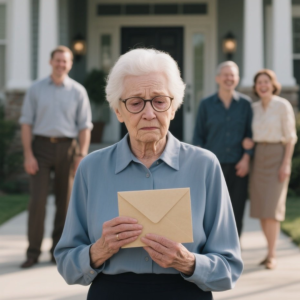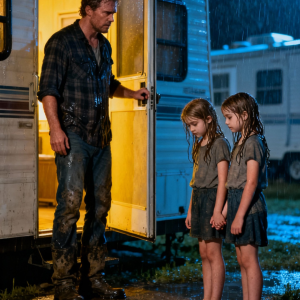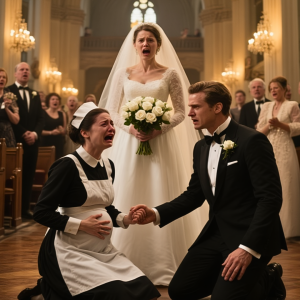
The afternoon sky over Bristol, England, was heavy with rain when Oliver Bennett, a quiet bicycle repairman, turned the sign on his shop door to closed. He was about to pull the shutters down when a small voice stopped him.
“Excuse me, sir. Would you buy my bicycle?”
Oliver turned. A little girl stood in the doorway, her hair damp from the drizzle, holding a faded blue bike that looked like it had seen better days. She could not have been more than eight. Her clothes were threadbare, and her shoes had holes at the toes.
He frowned gently. “Buy your bicycle? Why would you want to sell it, sweetheart?”
The girl hesitated before whispering, “I need money. My mum hasn’t eaten since yesterday.”
Oliver’s heart sank. “And your father?”
She looked down at her muddy shoes. “He went away last winter. He isn’t coming back.”
Oliver’s throat tightened. He had lost his wife to illness years ago, and the empty silence that followed still haunted him. Seeing this small child, soaked and trembling, stirred something deep inside him.
He crouched beside her, studying the little bicycle. Its tires were flat, and the chain was rusted through. It was barely worth a few coins. Yet to her, it was clearly the most precious thing she owned.
“How much were you hoping for?” he asked softly.
The girl bit her lip. “Maybe ten pounds. Enough for bread and soup.”
Oliver walked to the counter, took out a crisp fifty-pound note, and handed it to her. “I will give you this. You can keep your bicycle.”
Her eyes widened in disbelief. “But, sir, that is too much.”
He smiled faintly. “It is just right. I am buying a promise from you to keep riding that bike once your mum is better.”
She clutched the note as if it were gold. “Thank you, sir. Thank you so much!” Then she ran into the gray afternoon, her laughter mixing with the rain.

Oliver watched her disappear down the street. He told himself he had done his part. But that night, sleep would not come. Every time he closed his eyes, he saw her thin hands gripping the handlebars and heard her small voice saying, “My mum hasn’t eaten.”
By morning, he had made up his mind.
He asked around the neighborhood until someone at the corner shop remembered a girl who matched the description. “Lives in the flats near the river,” the shopkeeper said. “Always polite. Poor thing.”
Following the directions, Oliver found himself in front of a damp, crumbling building. The smell of mildew filled the stairwell as he climbed to the second floor. He knocked on a faded blue door.
After a moment, a frail woman opened it, coughing into her sleeve. Behind her, the girl sat cross-legged on the floor with a loaf of bread and a carton of milk beside her.
“Hello,” Oliver said gently. “I am the man from the bicycle shop.”
Recognition lit up the girl’s face. “Mum, this is the man I told you about!”
The woman looked embarrassed. “You have already done too much, sir. Please do not trouble yourself.”
Oliver shook his head. “It is no trouble at all. I brought some groceries and medicine. I could use help cleaning the shop if you are feeling up to it.”
Tears filled her eyes. “You would hire me?”
“Of course,” he said kindly. “And your daughter can come after school. She can learn how to fix bicycles. A fair trade, do you think?”
The woman nodded, unable to speak. The little girl smiled through tears, her face glowing with relief.
From that day on, their lives slowly began to change. The woman, whose name was Margaret, started working part-time at Bennett’s Bicycles. She was quiet but hardworking, and she always brought tea for Oliver during his long afternoons in the workshop. Her daughter, Anya, quickly became the heart of the shop, curious, bright, and full of energy.
“Mr. Bennett, look!” she would call, holding up a newly oiled chain. “I fixed it myself!”
He laughed softly. “You are a natural mechanic, Anya. One day, this place will be yours.”
Years passed. The shop that once echoed with silence now rang with laughter and the steady clatter of tools. Customers came not only for repairs but also for the warmth that seemed to live inside those brick walls.
Five years later, a new sign appeared above the door. Bennett and Anya’s Bicycle Workshop. The letters gleamed in gold, painted by Oliver himself.
One morning, a local reporter arrived to write about their story. Sitting behind the counter, Anya spoke shyly into the microphone. “I tried to sell my bike because I wanted food for my mum,” she said. “But Mr. Bennett did not just give us money. He gave us a future.”
The article spread quickly across the city. Donations poured in for struggling families, and volunteers offered to repair bikes for children in need.
When Oliver grew older, his hands began to tremble, and he knew it was time to step back. One quiet evening, he placed the shop keys in Anya’s hands.
“You have a gift,” he told her. “Keep this place alive. And promise me one thing. Help the next child who walks through that door.”
Anya nodded, her voice thick with emotion. “I promise.”
Years later, she kept that promise. Every winter, Bennett and Anya’s gave free bicycles to children who could not afford them. Each one bore a small silver tag engraved with the words, for those who need a little hope to keep moving forward.
And hanging on the shop’s back wall, above the tools and spare tires, was an old blue bicycle. Rusted and faded. It remained as a reminder that one small act of kindness could start a journey that changed lives forever.




